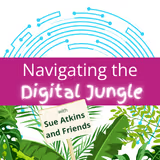Protecting Little Minds: Why Babies Need a Digital Detox Now
Sue Atkins, global parenting expert and digital wellness advocate, is on a mission to protect babies and toddlers from early screen exposure with her powerful new initiative: #ScreenFreeEarlyYears: Little Minds, Big Futures.
This movement promotes real-life bonding, sensory exploration, and emotional growth over passive screen time in early childhood.
📩 Sue is offering a free downloadable guide (PDF) for parents, hospitals, pediatricians, health visitors, and all those working with families.
👉 Email: thesueatkins@gmail.com
🌐 Learn more: navigatingthedigitaljungle.com
The #ScreenFreeEarlyYears movement, championed by Sue Atkins, focuses on minimizing screen time for young children, particularly in their early years, to promote healthy development and well-being. This involves prioritizing real-life interactions, play, and exploration over screen-based entertainment. The goal is to foster bonding, brain development, and a sense of presence in the world, free from digital distractions.
Key aspects of the #ScreenFreeEarlyYears movement:
* Prioritizing real-life experiences: Encouraging conversations, outdoor play, and engaging in activities that stimulate children's senses and imaginations.
* Creating screen-free zones: Establishing designated areas or times where screens are not allowed, such as during meals, storytime, or bedtime.
* Promoting mindful choices: Helping parents make informed decisions about screen time, understanding the potential impact on children's development.
* Focusing on the positive aspects of screen-free living: Highlighting the benefits of real-life interactions, such as improved language development, enhanced focus, and stronger emotional regulation.
* Providing resources and support: Offering guidance and tips for parents on how to navigate the digital age and minimize screen time in their children's lives.
Why is #ScreenFreeEarlyYears important?
* Brain development: The first years of life are crucial for brain development, and screen time can potentially disrupt this process by delaying language development, impacting focus, and replacing bonding time.
* Emotional regulation: Excessive screen time can contribute to emotional dysregulation in young children, making it harder for them to manage their emotions.
* Social-emotional development: Screen time can limit opportunities for social interaction and play, hindering the development of social skills and empathy.
* Mental health: Early exposure to screens can be linked to increased anxiety and depression in children.
* Physical health: Excessive screen time can contribute to sedentary behavior and obesity in children.
By embracing the principles of #ScreenFreeEarlyYears, parents can create a nurturing environment that supports their children's healthy development and well-being.
.svg)
.svg)
.svg)
.svg)



.avif)




